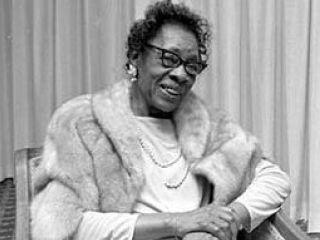
Section Branding
Header Content
Forgotten Women Part 5: Addie Byrd Byers
Primary Content

Savannah is a place that’s famously full of history. But many of the people who shaped that history, particularly women, are relatively unknown.
So GPB has created a series called “Forgotten Women” looking at some of the untold stories in the region.
Click here to find the rest of GPB Savannah's Forgotten Women series.
Addie Byrd Byers lived for nearly a century and helped pioneer Savannah's civil rights movement. Byers was born just a few years into the 20th Century, and became an advocate for equal educational opportunities for black children long before passage of the Civil Rights Act.
Richard Shinhoster is vice president of the local NAACP branch and owner of Diaspora Marketplace, a store on Martin Luther King Jr. Boulevard specializing in goods from Africa. "Addie Byers is an unsung hero," he says. "There's a street named after her, but very seldom does anyone mention her name."
Shinhoster says he applied to become a teacher in the late 1960s, and he looked up to Byers, who'd been teaching English for years. "But we had to sign a statement that said we were not a part of the NAACP...in order to teach in the school district, which I though was just horrible," Shinhoster says. "But I went to a meeting and Addie Byers was there and she was speaking and she said that young teachers should not sign that form. And that that was an invasion on our civil rights."
Shinhoster says he did not sign the form, and he got the job.
Byers's activism for civil rights with the NAACP inspired some of her students to eventually join, like Joe Lang. Today, at 84, he's the treasurer. Sitting in the office the NAACP's Savannah branch, Lang recalls Byers as a "no nonsense" teacher at Beach High School, where he graduated in the late 1940s. "She didn't play around and joke around with her students...but she was a motivator," Lang says. "She couldn't stand laziness. If she gave you some homework, she wanted you to put an effort in it and make sure that you gave it your best. She was the kind of person that made you strive for excellence."
Arna Cooper, 83, remembers Byers much the same way. "[She was] a fantastic English teacher. You had to get it. She didn't have any favorites," Cooper says. "She said as we grow up in life and face different things we need to be able to handle ourself properly."
Cooper says she transferred to Beach High School in 1947, after attending a Catholic grade school for black children and being denied admission to a Catholic high school. "They had promised us that we could go to St. Vincent's [Academy]. But because integration had not come about, they said we couldn't go," Cooper says. "But for all of those years in Catholic school, we had been taught that we were equal, and for them to...not accept us then, that was really a hurting point. And it took teachers like Ms. Byers...to really talk to us let us know that we were somebody and that we still could succeed."
Byers was perhaps most famous for her fight to integrate Savannah's libraries at a time when African American children were relegated to second-class citizens. According to her obituary in the Savannah Morning News, when a librarian told Byers that black children weren't allowed because they had "never asked," Byers responded that, "the black community didn't ask to pay taxes, either," pointing out that African Americans were funding the same system that shut them out.
Shinhoster, who's now 72, remembers the one library open to black children as small and poorly-stocked, with old books - even though there was a better library across town. "You would pass by it, you would look at it, and you would see white children going in there and of course you knew that that's a place that you could not go," he says. "And thanks to people like Addie Byers and the NAACP that was part of the movement to desegregate it - and eventually it was."
Byers eventually became the first African American woman to join the Chatham-Effingham-Liberty Regional Library board. She died in 2003 at the age of 97.
Tags: Addie Byers, forgotten women, Richard Shinhoster, Joe Lang, Arna Cooper, NAACP, Women, African American, Civil Rights, Sarah McCammon, GPB Savannah, GPB News, women's history, feminism, racism, integration, segregation, desegregation, schools, education
